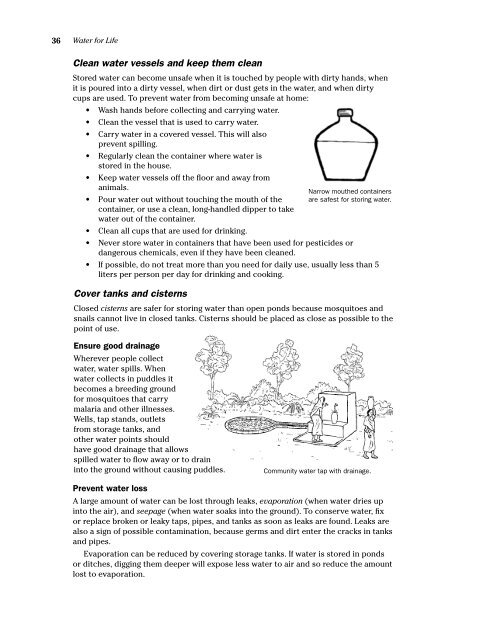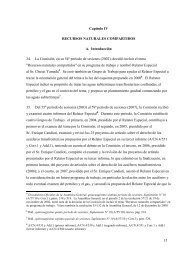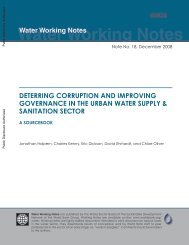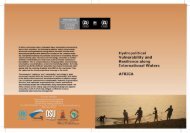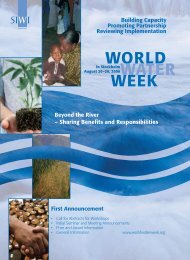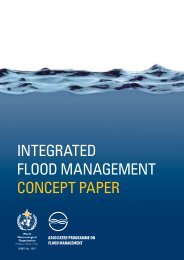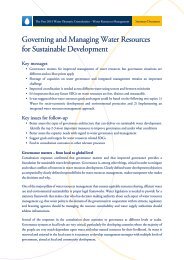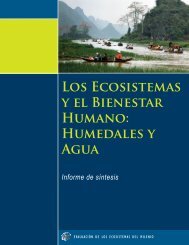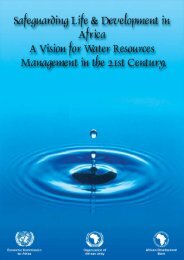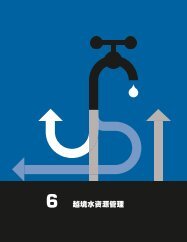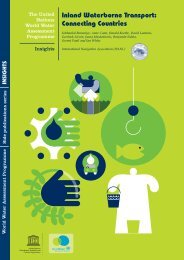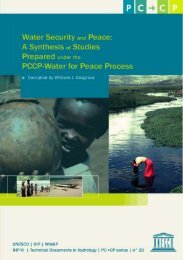Community water security - UN-Water
Community water security - UN-Water
Community water security - UN-Water
You also want an ePaper? Increase the reach of your titles
YUMPU automatically turns print PDFs into web optimized ePapers that Google loves.
36<br />
<strong>Water</strong> for Life<br />
Clean <strong>water</strong> vessels and keep them clean<br />
Stored <strong>water</strong> can become unsafe when it is touched by people with dirty hands, when<br />
it is poured into a dirty vessel, when dirt or dust gets in the <strong>water</strong>, and when dirty<br />
cups are used. To prevent <strong>water</strong> from becoming unsafe at home:<br />
• Wash hands before collecting and carrying <strong>water</strong>.<br />
• Clean the vessel that is used to carry <strong>water</strong>.<br />
• Carry <strong>water</strong> in a covered vessel. This will also<br />
prevent spilling.<br />
• Regularly clean the container where <strong>water</strong> is<br />
stored in the house.<br />
• Keep <strong>water</strong> vessels off the floor and away from<br />
animals.<br />
• Pour <strong>water</strong> out without touching the mouth of the<br />
container, or use a clean, long-handled dipper to take<br />
<strong>water</strong> out of the container.<br />
• Clean all cups that are used for drinking.<br />
Narrow mouthed containers<br />
are safest for storing <strong>water</strong>.<br />
• Never store <strong>water</strong> in containers that have been used for pesticides or<br />
dangerous chemicals, even if they have been cleaned.<br />
• If possible, do not treat more than you need for daily use, usually less than 5<br />
liters per person per day for drinking and cooking.<br />
Cover tanks and cisterns<br />
Closed cisterns are safer for storing <strong>water</strong> than open ponds because mosquitoes and<br />
snails cannot live in closed tanks. Cisterns should be placed as close as possible to the<br />
point of use.<br />
Ensure good drainage<br />
Wherever people collect<br />
<strong>water</strong>, <strong>water</strong> spills. When<br />
<strong>water</strong> collects in puddles it<br />
becomes a breeding ground<br />
for mosquitoes that carry<br />
malaria and other illnesses.<br />
Wells, tap stands, outlets<br />
from storage tanks, and<br />
other <strong>water</strong> points should<br />
have good drainage that allows<br />
spilled <strong>water</strong> to flow away or to drain<br />
into the ground without causing puddles.<br />
<strong>Community</strong> <strong>water</strong> tap with drainage.<br />
Prevent <strong>water</strong> loss<br />
A large amount of <strong>water</strong> can be lost through leaks, evaporation (when <strong>water</strong> dries up<br />
into the air), and seepage (when <strong>water</strong> soaks into the ground). To conserve <strong>water</strong>, fix<br />
or replace broken or leaky taps, pipes, and tanks as soon as leaks are found. Leaks are<br />
also a sign of possible contamination, because germs and dirt enter the cracks in tanks<br />
and pipes.<br />
Evaporation can be reduced by covering storage tanks. If <strong>water</strong> is stored in ponds<br />
or ditches, digging them deeper will expose less <strong>water</strong> to air and so reduce the amount<br />
lost to evaporation.


